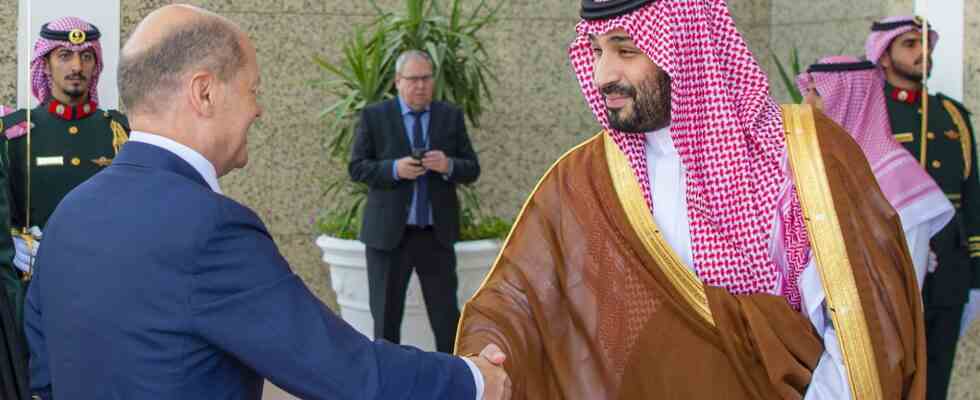Status: 09/24/2022 4:50 p.m
Chancellor Scholz has arrived in Saudi Arabia. After a long diplomatic ice age, the trip to the Arabian Peninsula is seen as a sign of a certain normalization. But the visit is delicate.
Federal Chancellor Olaf Scholz has arrived in Saudi Arabia at the start of a two-day trip to states in the Gulf region. The Saudi Crown Prince Mohammed bin Salman greeted him in the port city of Jeddah with a handshake. Discussions in private and in a larger circle as well as a joint lunch are planned.
Bin Salman is the de facto ruler of the most powerful country on the Arabian Peninsula. He is held responsible by the US secret service for the brutal murder of journalist Jamal Khashoggi in the Saudi Consulate General in Istanbul four years ago. The heir to the throne denies being the mastermind.
The murder led to bin Salman’s international isolation and plunged German-Saudi relations into a crisis that lasted for years.
Chancellor Scholz talks to Saudi Arabia’s Crown Prince bin Salman about cooperation in the energy sector
Nicole Kohnert, ARD Berlin, daily news at 8:00 p.m., September 24, 2022
Murder of Khashoggi openly addressed
At his meeting with Bin Salman, Scholz addressed the murder of Khashoggi. “We have discussed all questions that revolve around questions of civil and human rights,” he said after the conversation in response to a journalist’s question. “That’s the way it should be. And you can be sure that nothing that needs to be said has gone unanswered.”
Before the Chancellor’s visit, Germany’s most important allies were already in Saudi Arabia: French President Emmanuel Macron, British Prime Minister Boris Johnson, who has since resigned, and US President Joe Biden.
Biden had also addressed the murder of Khashoggi. After meeting bin Salman, the president reported at the time that the crown prince had denied responsibility for the crime. “I indicated that I think he is,” Biden said.
Closer energy partnership with Saudi Arabia
In the evening, Scholz travels to the United Arab Emirates and then to Qatar. Like Saudi Arabia, both countries are important energy exporters. According to government spokesman Steffen Hebestreit, in Jeddah, Abu Dhabi and Doha “the focus is on our commitment to a rule-based international order and the expansion of economic and energy cooperation”.
The Chancellor wants to develop a closer energy partnership with Saudi Arabia. This should not only extend to fossil raw materials, but also to hydrogen and renewable energies, said Scholz after the meeting with the crown prince.
It still seems unclear which contracts will be concluded for the supply of gas or – in the medium and long term – hydrogen from the region to Germany.
Scholz is accompanied by eleven top managers. Among others, Airbus, ThyssenKrupp and Siemens Energy are represented in the business delegation.
“Relying on hydrogen imports”
The energy industry is not only hoping for short-term gas exports from the Gulf region from the trip. “Germany and Europe will be dependent on importing hydrogen. It is all the more important to conclude international partnerships at an early stage,” said Kerstin Andreae, general manager of the Federal Association of Energy and Water Industries, the “Rheinische Post”.
Press conferences by the chancellor with his interlocutors are not planned during the trip. Despite a great deal of effort, it was not possible to convince the interlocutors of this, according to the German side.
Is Saudi Arabia demanding more arms deliveries?
But Saudi Arabia could also send requests to Germany. According to the peace research institute Sipri, the kingdom is one of the five largest armaments importers and Germany one of the five largest exporters.
Under the traffic light government, however, not a single armaments export to the kingdom was approved. This emerges from a response from the Ministry of Economic Affairs to a request from Left-wing MP Sevim Dagdelen, which the dpa news agency has received. The reason is an export ban that has been in effect since November 2018 due to Saudi Arabia’s involvement in the Yemen war and the Khashoggi murder.
So far, however, Scholz and his government have no longer made use of an exception rule for European joint projects. The former federal government issued 81 export licenses worth 33.27 million euros in 2020 and 2021. The Saudi government has repeatedly criticized the export ban.

